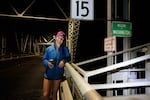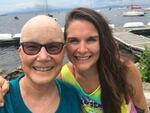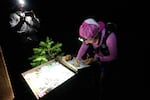
Emily Halnon celebrating on the Bridge of the Gods on the Oregon-Washington border in August 2020. Halnon set a new overall record for covering the Oregon Pacific Crest Trail in 7 days, 19 hours and 23 minutes.
Photo by Jon Meyers / Courtesy of Pegasus Books
In 2020, Eugene, Oregon, trail runner Emily Halnon did something faster than anyone’s ever done before. She broke the record for running the fastest known time of the Oregon Pacific Crest Trail, beating both the women’s and men’s records. That’s 460 miles from the California border to the Washington side of the Columbia Gorge. The physical achievement was also an emotional one. Halnon ran the Oregon PCT in honor of her mother after losing her to cancer.
Halnon’s new book, “To the Gorge,” breaks down her run mile by mile, and the resilience it took to reach the end of her journey to process her own grief.
Halnon will be at Powell’s City of Books in Portland at 7 p.m. Monday to talk about her new memoir. Halnon spoke about it with OPB “All Things Considered” producer Donald Orr.
The following conversation and transcript has been edited for length and clarity.
Donald Orr: So you did this run for your mom who was a runner herself. Can you tell me more about her, and what inspired you to follow in her literal footsteps?
Emily Halnon: My mother, Andrea, was not a runner for a lot of my life. She had a health scare when she was probably in her mid-40s, mid-to-late 40s, and that inspired her to incorporate a little bit more physical activity into her life. And then the year she turned 50, she ran her first full marathon. I was just so in awe of my mother and so inspired. I felt very moved to do a marathon myself, which — she actually went and ran it with me, and she beat me by 20 minutes that day. That started my own relationship with running, which continues through today. She lived with cancer for about 13 months and she lived with a lot of courage, joy, the same way she always had. So when she passed away, I was very moved to do something in that spirit, which is what led me to the Oregon PCT.

Emily Halnon and her mother, Andrea, along Lake Champlain in Vermont. Emily set the overall fastest known time on the Oregon Pacific Crest Trail, in celebration of her mother who passed away in January 2020 from a rare uterine cancer. Halnon raised over $34,000 for the Brave Like Gabe Foundation and rare cancer research.
Courtesy of Emily Halnon and Pegasus Books
Orr: You write about surviving the literal peaks and valleys of a grueling run. How did the physical toll of running help you process the emotional toll?
Halnon: Running and the outdoors is a place that tends to invite a little bit more emotional honesty. Like if you go and watch a marathon, no one’s hiding how they’re feeling during a marathon. I think when you show up on the trail, you just strip away so much of the external stuff and you let yourself feel what you’re feeling. And grief is so physical, we feel it in our bodies. When my mother died, I felt like my heart had turned into shards of glass and they were piercing every breath I took. To be moving through grief really helped that physical sensation of the emotional experience of grief — move through my body and not just sit there in this really painful state. Running is one of the most special ways that I was connected to my mother, and so to be able to hold on to running through grief helped me feel like I was holding on to part of my mother. I felt like she was helping me through grief that she was still able to mother me through this hardest thing that I’ve ever been through. Grief doesn’t go away. I still turn to running a lot.
Orr: You ran for 16 to 17 hours a day for over a week: 7 days, 19 hours and 23 minutes. What did you need to do to physically and mentally and emotionally prepare?
Halnon: Part of why I wanted to do this run was because I didn’t know if I could do it, and I wanted to start a run that felt like, I like to say the goal was punctuated by a question mark. I wanted it to push me in a really big way, and it delivered.
Orr: You also completed the run with support from friends, family and partner along the trail. What are some of your favorite memories of having loved ones join you?
Halnon: I had friends who surprised me with ‘trail magic.’ I had friends hike Dairy Queen miles into the woods — and I did it in August and it was just a really hot summer day. They had frozen a bottle of Powerade the night before, so it would still be ice cold when they got to me. To find that when you don’t think you’re going to be seeing anyone or accessing anything remotely cold or delicious for several miles and hours, that was amazing. I had friends who had dance parties with me along the way to keep me full of fun and joy. It did a lot for me.

Emily Halnon signing the trail register at the California-Oregon border on the Pacific Crest Trail on Aug. 1, 2020.
Courtesy of Jon Meyers / Pegasus Books
Orr: What do you think your mom would say if she were able to join you on this run or read your book?
Halnon: I’ve been thinking a lot about what my mother would be thinking right now. People are starting to read it now, and I’m hearing that my mom is inspiring so many people to do their own big, bold, brave things. Someone the other day was like, “I’m not a runner, but I think now I want to be.” So I think she would just feel so touched — to know that her story is going to inspire people and touch people. The run, she would’ve just been very stressed through it all. She was a proud mother, but also had a healthy amount of motherly concern about the big runs that I did. But she also would’ve been very proud of me for finishing that, and it would’ve meant a lot to her. But lots of motherly pride.
